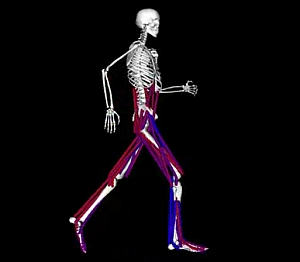A software package called OpenSim, developed by biomedical engineers at Stanford University in California, enables researchers and clinicians to simulate movements of human muscles. A participatory exhibit developed around OpenSim is now open at The Leonardo, a new Salt Lake City science and technology museum.
OpenSim builds musculo-skeletal models used in research on ergonomics, rehabilitation, orthopedics, and robotics. The software, say its developers, can be particularly useful to help clinicians and biomedical engineers study, diagnose, and correct abnormalities in how people move.
The Leonardo exhibit offers a look into the way OpenSim works and its value. In one part of the exhibit, visitors walk across a pressure-sensitive floor, and at the other side are given color-coded print outs of their weight distribution. These print-outs can identify even slight imbalances that might be putting undue stress on limbs and joints.
In another part of the exhibit, children can operate a scaled-down version of the software to vary the strength of leg muscles in a simulated video-game soccer player. The real-world operator adjusts the strength of two leg muscles on the simulated soccer player to generate the force necessary to kick a virtual ball into an on-screen goal.
OpenSim can help orthopedists determine if surgery to lengthen a specific muscle might help victims of cerebral palsy. The software can also be used to model changes in a person’s walking motion to reduce the incidence or severity of degenerative conditions such as osteoarthritis. In addition, OpenSim could be used to design more personalized prosthetic devices that are better able to read and interpret electrical impulses to control the devices.
The software is distributed open-source, which means its source code, written in C++ and Java, is offered as a free license that encourages follow-on development of enhancements, utilities, and plug-ins.
The following video tells more about OpenSim and The Leonardo exhibit.
Read More: Self-Powered Prosthetic Leg Developed, Patented, Licensed
* * *


 RSS - Posts
RSS - Posts
You must be logged in to post a comment.